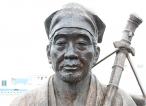Biography

Matsuo Basho was a japanese famous poet. Born in 1644 with the name of Matsuo Kinsaku, he changed his name to Matsuo Ch?emon Munefusa.
He was one of the most famous poet of the Edo period in Japan. During his lifetime, Basho was recognized for his works in the collaborative haikai no renga form; today, after centuries of commentary, he is recognized as the greatest master of haiku (at the time called hokku). His poetry is internationally renowned, and in Japan many of his poems are reproduced on monuments and traditional sites. Although Basho is justifiably famous in the west for his hokku, he himself believed his best work lay in leading and participating in renku. He is quoted as saying, “Many of my followers can write hokku as well as I can. Where I show who I really am is in linking haikai verses".
Basho was introduced to poetry at a young age, and after integrating himself into the intellectual scene of Edo (modern Tokyo), he quickly became well-known throughout Japan. He made a living as a teacher, but renounced the social, urban life of the literary circles and was inclined to wander throughout the country, heading west, east, and far into the northern wilderness to gain inspiration for his writing. His poems were influenced by his firsthand experience of the world around him, often encapsulating the feeling of a scene in a few simple elements.
Despite his success, Basho grew dissatisfied and lonely. He began to practice Zen meditation, but it seems not to have calmed his mind. In the winter of 1682 his hut burned down, and shortly afterwards, in early 1683, his mother died. He then traveled to Yamura, to stay with a friend. In the winter of 1683 his disciples gave him a second hut in Edo, but his spirits did not improve. In 1684 his disciple Takarai Kikaku published a compilation of him and other poets, Shriveled Chestnuts. Later that year he left Edo on the first of four major wanderings.
Traveling in medieval Japan was immensely dangerous, and at first Basho expected to simply die in the middle of nowhere or be killed by bandits. As the trip progressed, his mood improved and he became comfortable on the road. He met many friends and grew to enjoy the changing scenery and the seasons. His poems took on a less introspective and more striking tone as he observed the world around him.
Basho left Edo for the last time in the summer of 1694, spending time in Ueno and Kyoto before his arrival in Osaka. He became sick with a stomach illness and died peacefully, surrounded by his disciples. Although he did not compose any formal death poem on his deathbed the following, being the last poem recorded during his final illness, is generally accepted as his poem of farewell:
falling sick on a journey
my dream goes wandering
over a field of dried grass
Kai Ōi (The Seashell Game) (1672)
Edo Sangin (江戸三吟?) (1678)
Inaka no Kuawase (田舎之句合?) (1680)
Tōsei Montei Dokugin Nijū Kasen (桃青門弟独吟廿歌仙?) (1680)
Tokiwaya no Kuawase (常盤屋句合?) (1680)
Minashiguri (虚栗?, "A Shriveled Chestnut") (1683)
Nozarashi Kikō (Record of a Weather-Exposed Skeleton) (1684)
*Fuyu no Hi (Winter Days) (1684)
Haru no Hi (Spring Days) (1686)
Kawazu Awase (Frog Contest) (1686)
Kashima Kikō (A Visit to Kashima Shrine) (1687)
Oi no Kobumi, or Utatsu Kikō (Record of a Travel-Worn Satchel) (1688)
Sarashina Kikō (A Visit to Sarashina Village) (1688)
Arano (Wasteland) (1689)
Hisago (The Gourd) (1690)
Sarumino (The Monkey's Raincoat) (1691)
Saga Nikki (Saga Diary) (1691)
Bashō no Utsusu Kotoba (On Transplanting the Banana Tree) (1691)
Heikan no Setsu (On Seclusion) (1692)
Fukagawa Shū (Fukagawa Anthology)
Sumidawara (A Sack of Charcoal) (1694)
Betsuzashiki (The Detached Room) (1694)
Oku no Hosomichi (Narrow Road to the Interior) (1694)
Zoku Sarumino (The Monkey's Raincoat, Continued) (1698)
Last updated January 19, 2013



